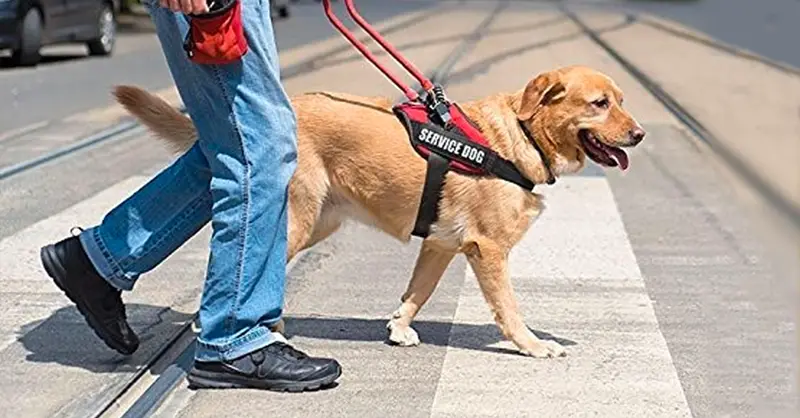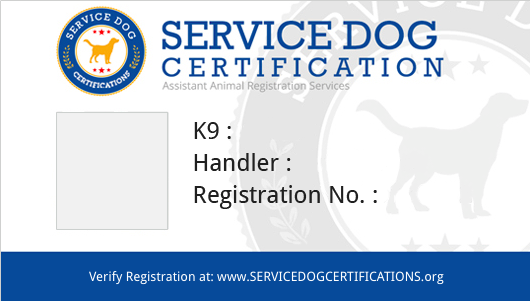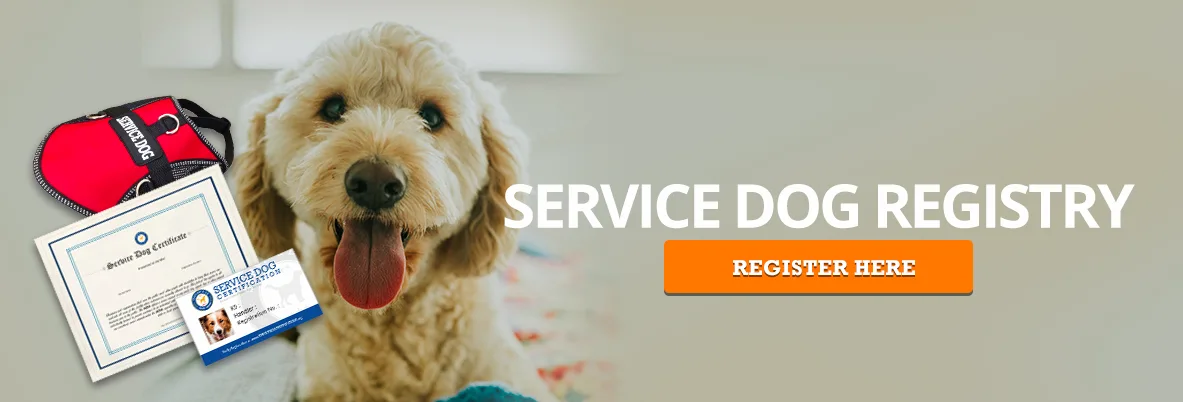Home Page › Blog › ADA Service Dog Laws
ADA Service Dog Laws

Service dog handlers are afforded specific rights and protections under the Americans with Disabilities Act (ADA). Every service dog handler needs to understand their legal rights and how to exercise them. It is also important for staff members at establishments such as restaurants, stores, hotels, schools, and other public locations to understand how they can properly verify a service dog without running afoul of ADA rules. In this article, we will explain what rights service dog handlers have under the ADA, how an animal companion qualifies as a service dog, and what staff members at public establishments are permitted and not permitted to ask a service dog owner. Here’s an overview of the questions answered:
- 1. What is a service animal?
- 2. How does the ADA define a disability?
- 3. What disabilities qualify for a service dog under the ADA?
- 4. Where are service dogs allowed?
- 5. Can I board flights with my service dog?
- 6. What questions am I allowed to ask a service dog owner?
- 7. Do I need a professional trainer to train my service dog? Can I train my service dog myself?
- 8. Which dog breeds can be service dogs?
- 9. Are emotional support animals the same as service animals?
- 10. When can a business ask a service dog and its handler to leave an establishment?
- 11. Do I need a vest, ID card, or special harness for my service dog?
- 12. How do I certify or register my service dog?
- 13. My city requires dogs to be registered and licensed. Are service dogs exempt?
- 14. My city requires that dogs be vaccinated. Is that applicable to service dogs?
- 15. Can a service dog be off leash?
- 16. Can a restaurant or hotel force my service dog to remain in a certain area?
- 17. Can a hotel charge me for staying with a service dog?
- 18. Are service dogs allowed in self-service restaurants, such as buffets?
- 19. Are restaurants required to allow service dogs to be seated on chairs or be fed at the table?
1. What is a service animal?
Trained dog: The ADA defines a service animal as a dog that is individually trained to do work or perform tasks for someone with a disability.
Training can include a variety of tasks such as alerting people who are deaf, guiding people who are visually impaired, calming a person during an anxiety attack, reminding people with psychiatric conditions to take medications, or protecting a person who is experiencing a seizure.
Psychiatric service: Service dogs that assist with mental and emotional health issues or learning disabilities are called psychiatric service dogs (PSDs). Psychiatric service dogs are a type of service dog and have the same rights as service dogs that assist people with physical disabilities. All references to “service dogs” in this article include psychiatric service dogs.
Training is not one-size-fits-all. Service dogs are remarkable canines capable of a wide range of tasks that help make independent living possible for their handlers; they undergo specialized training to learn tasks that mitigate the difficulties caused by the specific disabilities of their handler. Service dogs are working animals – not pets.
2. How does the ADA define a disability?
Definition: Under the ADA, a person with a disability has a “physical or mental impairment that substantially limits one or more major life activity.” This includes individuals who are regarded as having a disability even if their disability is not physically visible (i.e., mental health conditions and learning disabilities).
Additional rights: In addition to the ADA, owners of service dogs have rights under the Fair Housing Act (FHA), Air Carrier Access Act (ACAA), and various state laws.
3. What disabilities qualify for a service dog under the ADA?
Assessing qualification: In the context of the ADA, “disability” is a legal term, not a medical one, and has a specific definition: an impairment that substantially limits at least one major life activity. A disabled person can also be someone who has a history or record of such an impairment or a person who is perceived by others as having such an impairment. Thus, it is up to individuals and their licensed healthcare professionals to assess whether this qualification is met.
There’s no list: The ADA does not specifically list out every type of impairment that qualifies as a disability. The disability can be a physical disability, such as blindness or impaired mobility, or it can be an invisible disability in the form of a mental condition, such as PTSD, depression, or anxiety.
4. Where are service dogs allowed?
In public: Businesses, nonprofit organizations, and state and local governments that serve the public are generally required to allow service dogs to accompany people with disabilities in any areas open to the public. This would include restaurants, grocery stores, retail stores, hotels, office buildings, school campuses, parks, and other establishments open to the public.
In the sky and at home: Service dogs can also board the cabin of airplanes with their owners without having to pay a pet fee. Service dogs also have housing rights: They are allowed to live with their owners free of charge or deposits, even in buildings that prohibit pets.
5. Can I board flights with my service dog?
The rules: Service dogs (including psychiatric service dogs) are allowed to board flights with their owners, free of charge. The US Department of Transportation implemented new regulations in early 2021 that effectively ended the ability of emotional support animals to board most US flights. However, the DOT affirmed the right of service dogs and psychiatric service dogs to board flights in the cabin. Flights to, from, and within the US fall under the scope of these protections.
What you have to do: Airlines cannot charge fees for service dogs to board, but, to fly with a service dog, the passenger must submit a completed DOT Service Animal Transportation Form to the airline before boarding. The form requires the service dog handler to self-certify that they have a trained service animal. It also requires the name of the dog’s trainer (which can be the handler) and the name (but not the signature) of the dog’s veterinarian.
For a complete guide to flying with a service animal or psychiatric service animal, check out this helpful article.
6. What questions am I allowed to ask a service dog owner?
Allowed: The staff or employees at a public establishment such as a restaurant, bar, store, hotel, office building, or school may only as two limited questions if and only if it is not obvious what service the dog provides:
- Is the dog a service animal that is required because of a disability?
- What work or task has the dog been trained to perform?
Not allowed: The staff member cannot require a doctor’s note, inquire about the handler’s disability, ask for an identification card or training certificate, or demand medical documents.
In addition, staff members are not permitted to ask the handler to have their service dog demonstrate its ability to perform work for the owner. It is also important to note that the two questions above are only allowed if the disability is not apparent. For example, if the service dog is being used as a guide dog for a blind person, it would not be appropriate to interrogate them about their service dog.
7. Do I need a professional trainer to train my service dog? Can I train my service dog myself?
The choice is yours: ADA service dog rules do not require that service dog handlers use a professional trainer. To make your dog a service dog, you do not need to complete any specific training program. Service dog handlers are allowed to train their dog themselves without the help of a professional trainer or training program.
Timing: Service dog owners should note that under ADA rules, service dogs in training are not yet considered to be service animals. That means that before a service dog owner can enjoy all of the rights afforded to service dog owners under the ADA, their dog must be fully trained to perform the task that assists with the handler’s disability. However, some state and local laws may give rights to dogs that are still in the training stages.
8. Which dog breeds can be service dogs?
Under ADA rules, a service dog can be of any breed. A public establishment or landlord is not allowed to prohibit entry for a service dog solely based on its breed. The service dog may be asked to leave the premises if it is not under the control of the handler or acts in a way that threatens the health and safety of others. However, staff members and landlords at an establishment or apartment complex cannot ask a service dog to leave simply because they are afraid of the dog solely due to preconceived notions about the dog’s breed.
ADA rules also take precedence over local rules regarding breed restrictions. For example, if your city bans a certain dog breed, that ban cannot be categorically applied to service animals.
9. Are emotional support animals the same as service animals?
No, emotional support animals, or ESAs, are not the same as service animals. The ADA does not protect dogs who solely provide emotional support or comfort as service animals. Unlike service dogs, emotional support animals do not require any special training.
Emotional support animals are intended to provide support for mental and emotional disabilities through companionship. ESAs have more limited access rights than service dogs. Emotional support animals are allowed in residences and on flights but do not have a right to be in places such as stores, hotels, or restaurants that prohibit pets the same way service dogs do.
That does not mean a service dog cannot assist with a psychiatric condition. For example, a service dog can be used to remind depressed individuals to take their medication. Or, for someone with anxiety, a service dog can be trained to sense an impending anxiety attack and take actions to prevent the attack or minimize its impact. However, if a person with anxiety is just using the dog’s companionship as a source of comfort for their condition, the animal would not qualify as a service dog.
10. When can a business ask a service dog and its handler to leave an establishment?
A disabled person with a service dog can only be asked to remove their animal from the premises in very limited circumstances. It is appropriate for staff members to ask a handler to remove their service dog if the dog is out of control or the dog is not housebroken. A service dog handler may also be asked to leave if their service dog’s actions threaten the health and safety of other people.
It is not appropriate to ask a service dog to leave due to allergies or a fear of dogs. Under ADA guidance, if someone is allergic to a dog and needs to share space with a disabled person and their service dog, both people should be accommodated by assigning them, where possible, to different locations within the room or facility.
11. Do I need a vest, ID card, or special harness for my service dog?
The ADA does not specify requirements for items such as vests, ID cards, or special harnesses. However, many service dog owners utilize these accessories as helpful tools that signal to the public that their dog is a service dog. By using a service dog ID card, vest, or harness, service dog handlers can clearly indicate to members of the public that their dog is on duty and should not be disturbed. These accessories help to set proper boundaries so handlers can avoid invasive inquiries and interactions.
12. How do I certify or register my service dog?
Service animals do not need to be certified or registered to qualify as service animals. Employees and staff are not permitted to require documentation from a handler that the animal is certified, trained, or licensed as a service animal as a condition for entry.
Some service dog owners will certify or register their dogs through an organization to help notify others that their animal is a service dog. However, these documents are optional and do not by themselves convey legal rights under the ADA.
13. My city requires dogs to be registered and licensed. Are service dogs exempt?
No, service dogs are not exempt from local registration and licensing requirements that apply to all dogs. This is different from organizations that register and license dogs as service animals. As discussed earlier, these organizations do not confer any official status on service dogs; their services are optional. If your city, however, requires all dogs to be licensed and registered, your service dog must also comply.
14. My city requires that dogs be vaccinated. Is that applicable to service dogs?
Yes, service dogs are not exempt from local rules regarding animal control and health. If your city requires vaccinations for all dogs, then your service dog must also comply.
15. Can a service dog be off leash?
Under ADA rules, a service dog must always be under the control of its handler and must be tethered, harnessed, or leashed unless the handler’s disability prevents them from using these items or these items interfere with the dog’s ability to safely and effectively perform its tasks. In situations where a tether, harness, or leash is not suitable, the handler must maintain control of their service dog through voice, signal, or other means of control. An establishment can ask a handler to remove their service dog from the premises if the handler does not have control of their animal.
16. Can a restaurant or hotel force my service dog to remain in a certain area?
No, under ADA rules, handlers with service dogs cannot be isolated from other customers or treated less favorably than other customers. The establishment cannot have a special area for service dogs and limit the handler’s activities to that one area. For example, a hotel cannot limit guests with service dogs to designated “pet-friendly” rooms.
17. Can a hotel charge me for staying with a service dog?
No, a business can never charge a deposit or fee in connection with service dogs. If the hotel charges a fee for pets, it must waive that fee for a guest staying with a service dog. Hotels are also not allowed to charge service dog owners cleaning fees to clean up hair or dander shed by the dog. However, a handler can be held responsible for paying for any damage caused by their service dog.
18. Are service dogs allowed in self-service restaurants, such as buffets?
Yes, service dogs must be allowed to accompany their owners through self-service food areas such as salad bars and buffets. Service animals are also allowed in cafeterias, such as those in the workplace or on school campuses.
19. Are restaurants required to allow service dogs to be seated on chairs or be fed at the table?
No, seating at a restaurant and the food served at the establishment are for patrons only. A service dog owner is allowed to have their animal companion next to them, but they cannot expect the restaurant to allow the dog to be seated or fed at the table.
About the Author: The writing team at Service Dog Certifications is made up of folks who really know their stuff when it comes to disability laws and assistance animals. Many of our writers and editors have service dogs themselves and share insights from their own experiences. All of us have a passion for disability rights and animals.
Latest Posts

Ohio Service Dog Requirements
You can bring a service dog almost anywhere where pets aren’t allowed in Ohio as long as you meet all the necessary requirements. The rights of service dog handlers in the Buckeye State are covered under federal and state laws. This guide will walk you through Ohio’s legal requirements for service dogs. Ohio Health Requirements […]

Read More

How to Bring a Service Dog to Disneyland
Trained service dogs are more than welcome to join their handlers at Disneyland. In this guide, we’ll explain Disneyland’s policies and give practical advice for bringing a service dog to Disneyland for the first time. Disneyland’s Service Dog Policies The Magic Kingdom is happy to welcome trained service dogs across most park locations! They kindly […]

Read More

Can Dogs Eat Tomatoes?
Yes! Dogs can safely enjoy tomatoes, but there are a few risks to be aware of so you can feed your dog responsibly. Fully ripe tomatoes (without the stems and leaves) can actually have nutrients that are good for your pup. Tomatoes have chlorogenic acid, an antioxidant that can have anti-inflammatory effects in cells. They’re […]

Read More








AS a business owner, we get a lot pf people who declare their animal is a “service animal”. I ask one of the two acceptable legal questions – and the answer is often times ambiguous. I need some sort of list of what is considered an ADA recognized disability, otherwise people can say ANYTHING and I am obligated to let the pet in – often times it’s NOT an ADA recognized service dog. How can I differentiate and stop the public form abusing the rights of actual ADA recognized service dogs and their owners?
In answering the two questions, the handler does not have to state what their disability is. They only have to confirm they have a service dog required for a disability. They must also be able to describe what work or task their service dog has been trained to do.
By looking at how well behaved the dog is. A pet is more often than not NOT going to be well behaved. There is no list. If the dog performs a specific task for a disability, it is a service dog. You don’t get to make things difficult for the legit ones because of the liars.
My friend & I were walking on an in-town trail,when we came upon a dog about a block in front of its master…wandering along the side of the trail…when we passed the master,I mentioned that dogs are suppose to be on a leash. He replied “Its a service dog, I don’t have to have him on a leash & I have papers”. We didn’t notice if the dog was wearing a service dog vest, since he was just kinda wandering. I’ve been bitten by an unleashed dog, so this hits a sore spot with me. So, the question here is…on a trail, where there are signs posted to keep your dog on a leash, are service dogs the exception? Thanks
Service dogs are allowed in public areas like trails. Documentation alone however does not prove that the person had a legitimate service dog. Third parties have the right to confirm service dogs by asking two questions: 1. Is the dog a service dog required for a disability? and 2. What work or task has the dog been trained to perform?
My landlord is refusing to allow my daughter to visit me with her service dog “because all dogs are banned from the premises”. I can’t find anything direct on visiting. Only being a tenant. Is this legal?
Service dogs have broad public access rights, including at residences. Landlords must accommodate tenants and guests who require the use of a service dog for their disability.
This is 2023, have any laws changed since this article was written to better identify a service dog?
The primary way to verify a service dog remains the same, third parties can verbally ask the following two questions: 1. Is the dog a service dog required for a disability? and 2. What work or task has the dog been trained to perform?
Why wouldn’t it be simpler to require ID on the dog that certifies it a true service dog — in order to ferret out the imposters in public? In order to drive a car we are all required to have our license on us. Service dogs could be identified in this way visually and imposters would not be able to fool us?
Also, an informational card or small pamphlet to hand out to people who attempt to engage with a service dog teaching those uninformed about protocols with these working dogs seems like a good idea as well– a public service ad campaign to broadly educate Ametica on the facts about service dogs ( and the fakes).
That would cost taxpayers millions of $$. Who would be in charge of issuing the certification and who would regulate the certifications? Who pays the millions in lawsuits when whatever entity that issues the certification discriminates against someone by not issuing them a certification at some point? Just a lot more hassle to certify than not to certify…
That would cost taxpayers millions of $$. Answer: Isn’t this what taxpayer $$$ are for? Who would be in charge of issuing the certification and who would regulate the certifications? Answer: The same people why certified the animal in the first place would be in charge of issuing the certificate! The local government or even animal control would regulate! Who pays the millions in lawsuits when whatever entity that issues the certification discriminates against someone by not issuing them a certification at some point? Answer: Why would this happen if the animal passed it’s training for becoming a service animal? Just a lot more hassle to certify than not to certify…Answer: I disagree. Who is going to pay the lawsuits & vet bills when someone gets bit by an animal that has been improperly passed off as a service animal? If a 3rd party is not allowed to properly identify an animal as a service animal, then we are all vulnerable & open to scammers & potentially harmful animals.
How would you feel if everytime you were driving, some random person asked to see your drivers license? I mean how do I know that you are driving legally? There are many reasons why I do not want to put a vest on my dog, why the hell should I have to prove to you what I have done to make sure my dog is what I say she is.